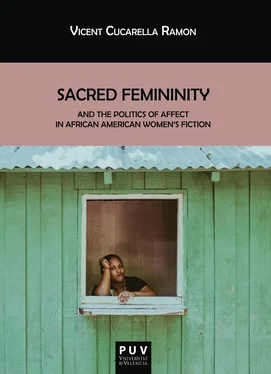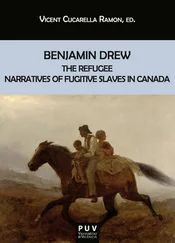SACRED FEMININITY
AND THE POLITICS OF AFFECT
IN AFRICAN AMERICAN WOMEN’S FICTION
Biblioteca Javier Coy d’estudis nord-americans
http://puv.uv.es/biblioteca-javier-coy-destudis-nord-americans.html http://bibliotecajaviercoy.com
Directora
Carme Manuel
SACRED FEMININITY
AND THE POLITICS OF AFFECT
IN AFRICAN AMERICAN WOMEN’S FICTION
Vicent Cucarella Ramon
Biblioteca Javier Coy d’estudis nord-americans
Universitat de València
Vicent Cucarella Ramon
Sacred Femininity and the Politics of Affect in African American Women’s Fiction
1ª edición de 2017
Reservados todos los derechos
Prohibida su reproducción total o parcial
ISBN: 978-84-9134-318-9
Ilustración de la cubierta: Jorge Orrico
Diseño de la cubierta: Celso Hernández de la Figuera
Publicacions de la Universitat de València
http://puv.uv.es publicacions@uv.es
A ma mare i a mon pare, per una estima gairebé sagrada
A la meua germana, la millor xarxa d'afecte
Contents
INTRODUCTION
CHAPTER 1
Sacred Femininity in Search of a Black Female Aesthetic
CHAPTER 2
Hannah Crafts’s The Bondwoman’s Narrative and the Promise of the Sacred Female Self
CHAPTER 3
Zora Neale Hurston’s Moses, Man of the Mountain , the Paradigm of Growth and the Spiritual Principles of Art
CHAPTER 4
Toni Morrison’s A Mercy and the Declension of Sacredness in a Globalized Era
CONCLUSION
BIBLIOGRAPHY
Introduction
Nothing that God ever made is the same thing to more than one person. That is natural. There is no single face in nature, because every eye that looks upon it, sees it from its own angle. So every man’s spice-box seasons his own food.
Zora Neale Hurston, Their Eyes Were Watching God
In her seminal slave narrative Incidents in the Life of a Slave Girl (1861) Harriet Jacobs makes a powerful statement that is shared by Hannah Crafts’s The Bondwoman’s Narrative (1857), Zora Neale Hurston’s Moses, Man of the Mountain (1939) and Toni Morrison’s A Mercy (2008), the three novels here. By claiming that “(t)here is a great difference between Christianity and religion” (83), Jacobs voices the stark reality that black slaves encountered when they were faced with the sociocultural reality of the New World. In their ontological struggle for survival, African Americans found the necessity to distinguish their sense of spirituality from the religious doctrines that legalized the lives of American citizens. However, black women had to fight harder to recompose their sense of spirituality given their double discrimination in a nation that relegated them out of any possible circle of social redemption.
In this light, Crafts’s, Hurston’s and Morrison’s texts connect the sacredness that has played a pivotal part in the appraisal of the subjectivity of African American women ever since they first set foot in the United States with the aesthetic modes of representation that black women created through their genuine use of religion. The reconfiguration of the Biblical Christian message has come to be culturally ingrained into the collective African American psyche and it has aptly been reinterpreted by black women.
Religion and the idiosyncrasy of the United States have an interrelated relationship that has come to configure the patriotic ethos of the nation. The teachings of the Puritans in the seventeenth century built the pillars of the nascent community and opened the way to material as well as spiritual prosperity. The Puritan creed turned out to be the framework of an ongoing historical enterprise that has outlived four centuries. The character of the young nation revealed a spiritual base that helped rewrite history and erect an American exceptionalism as a defining trait of its national ethos. Briefly put and in Sacvan Bercovitch’s words, at the dawning of the American nationalism “History is invoked to displace historicism” (1977: 5). The result was the contour of what Robert Bellah coined as “civil religion” over the cognizance of the nation or a public religious dimension “expressed in a set of beliefs, symbols, and rituals” that bound the political and cultural life in the United States building upon “the motivating spirit of those who founded America” (2).
Religious discourse and practice stand as a backbone of the American national ideology, and African American women have used its political but also its aesthetic matrix to unfold a black feminine discourse deeply attached to the cultural outlet that the nation offered them. Charles H. Long rightly notes how, when it comes down to religious discourses, “African Americans…fall into an anomalous position” (18). Black Americans merged “a kind of African American civil religion within the confines of Christianity” (Hong 18) along the shakedown of the Black Atlantic. The African slave trade ensured the human and social destruction of black people and the Black Atlantic bestowed African Americans the opportunity to redefine their subjectivity and to cradle their self-definition in the United States. This is so because the Atlantic world introduced black people to “the globalization of the meaning of humanity” (Hong 19). As Hong further explains, the Atlantic “is a world justified by the epistemologies of Kant and Descartes, the English empiricists, and the ethical economies of Adam Smith and Karl Marx. The world of the Atlantic lives under the rhetoric and mark of freedom—a freedom that was supposed to banish the specter of the ancient gods and reveal a new deeper structure of the meaning of human experience” (Hong 20).
Taking this cultural endeavor and its possibilities to offer a new side to the meaning of human experience African American women relied on the spirituality of what has come to be known as black Christianity to foster the creation of a feminist version of spirituality that could invigorate the aesthetics of communal healing in the United States. Black Christianity refers to a certain reading of the Christian message aiming to make it fit to the specific needs of African Americans. In this sense, black Christianity speaks about the distance among professed belief in the Christian Gospel and in the practice of slavery under the oppressive ideology of white supremacy.
The wrenching intimacy between spirituality and self-assertion was a common trope in the spiritual autobiographies penned in the late eighteenth and nineteenth centuries by African American women. Works such as Maria Stewart’s Productions of Mrs. Maria W. Stewart (1835), and Meditations from the Pen of Mrs. Maria W. Stewart (1879), Jarena Lee’s The Religious Experiences of Mrs. Jarena Lee (1836, 1849), Zilpha Elaw’s Memoirs of the Life, Religious Experience, Ministerial Travels, and Labors of Mrs. Zilpha Elaw, An American Female of Colour (1846), The Story of Mattie J. Jackson (1866), and Julia Foote’s A Brand Plucked from the Fire (1879), among others, prove black women’s commitment to the creation of a spiritual aesthetics in the composition of a healed black female self. Moreover, Joycelyn Moody positions these writings within the jeremiad tradition of “moral suasion, deep feeling, and a shared sense of social justice”.
The Bondwoman’s Narrative, Moses, Man of the Mountain and A Mercy follow the spiritual endeavor of these autobiographies by constructing a sacred reading of the black female self that aims to uphold a new version of womanhood. Besides, and as the referred spiritual autobiographies belabored, these novels also follow the national continuum of the jeremiad tradition not only to recast the Biblical discourse but to defend the incursion of a rehabilitated black female subjectivity.
Читать дальше












